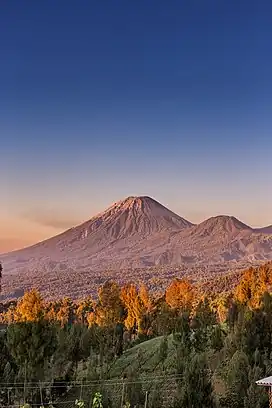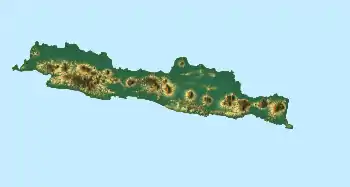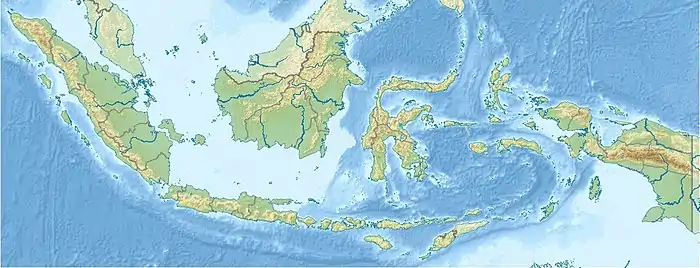Semeru
The Semeru (Javanese: ꦱꦼꦩꦺꦫꦸ), or Mount Semeru (Javanese: ꦒꦸꦤꦸꦁꦱꦼꦩꦺꦫꦸ (Pegon:ڮنڠ سمَيرو, romanized: Gunung Semeru)) is an active volcano located in East Java, Indonesia. It is located in a subduction zone, where the Indo-Australian plate subducts under the Eurasia plate.[3] It is the highest mountain on the island of Java. The name "Semeru" is derived from Meru, the central world mountain in Hinduism, or Sumeru, the abode of gods. This stratovolcano is also known as Mahameru, meaning "The Great Mountain" in Sanskrit.[4][1] It is one of the more popular hiking destinations in Indonesia.
| Semeru | |
|---|---|
 | |
| Highest point | |
| Elevation | 3,676 m (12,060 ft)[1] |
| Prominence | 3,676 m (12,060 ft) |
| Isolation | 390.92 km (242.91 mi) |
| Listing | Island high point 12th Ultra Ribu |
| Coordinates | 08°06′28″S 112°55′19″E |
| Geography | |
| Geology | |
| Mountain type | Stratovolcano |
| Volcanic arc/belt | Ring of Fire/Sunda Arc |
| Last eruption | 4 December 2022 (ongoing) [2] |
| Climbing | |
| First ascent | Unknown |
| Easiest route | Hike |
Geology
Semeru rises steeply above the coastal plains of eastern Java. Maars containing crater lakes have formed along a line through the summit of the volcano. It was formed south of the overlapping Ajek-ajek and Jambagan calderas.[5] The eruptive products are andesitic.[6] Semeru lies at the south end of the Tengger Volcanic Complex.
Eruptive history
Semeru's eruptive history is extensive. Since 1818, at least 55 eruptions have been recorded (11 of which resulted in fatalities) consisting of both lava flows and pyroclastic flows. All historical eruptions have had a Volcanic Explosivity Index (VEI) of 2 or 3.[7] Semeru has been in a state of near-constant eruption from 1967 to the present.[8]
Semeru is regularly climbed by tourists, usually starting from the village of Ranu Pane to the north, but though non-technical, it can be dangerous. Soe Hok Gie, an Indonesian political activist of the 1960s, died in 1969 from inhaling poisonous gases while hiking on Mount Semeru.[9]
2021 eruption
On 4 December 2021, Semeru erupted for a second time in the year – the first having been on 16 January 2021.[10] Semeru erupted a third time on 6 December 2021.[11]
At least 57 people died,[12] 104 more were injured, while 23 are unaccounted for.[13][14][15][16] Thousands were displaced. [17][18][19][20][21]
Mythology
Semeru is named after Sumeru, the central world-mountain in Hinduism. As stated in legend, it was transplanted from India to create the island of Java; the tale is recorded in the 15th-century East Javanese work Tantu Pagelaran. It was originally placed in the western part of the island, but that caused the island to tip, so the gods moved it eastward. On that journey, parts kept coming off the lower rim, forming the mountains Lawu, Wilis, Kelud, Kawi, Arjuno and Welirang. The damage thus caused to the foot of the mountain caused it to shake, and the top came off and created Penanggungan as well.[24] Indonesian Hindus also hold a belief that the mountain is the abode of Shiva in Java.[25]
Floral problems
Non-native invasive plants
25 non-native plants have been found in Mount Semeru National Park. The non-native plants, which threaten the endemic local plants, were imported by Dutch botanist Van Steenis, in the colonial era. They include Foeniculum vulgare, Verbena brasiliensis, Chromolaena odorata, and Salvinia molesta.[26]
Vegetable plantations
Mud erosion from surrounding vegetable plantations is adding silt to Ranu Pani Lake, causing the lake to gradually shrink. Research has predicted that the lake will disappear by about 2025, unless the vegetable plantations on the hillsides are replaced with more ecologically sustainable perennials.[27]
See also
Citations
- "Global Volcanism Program | Semeru". Smithsonian Institution | Global Volcanism Program. Retrieved 29 September 2022.
- Associated Press (4 December 2022). "Residents are evacuating as Mount Semeru, Indonesia's highest volcano, has erupted". Retrieved 4 December 2022.
- "Mount Semeru".
- "Indonesia: Death toll rises to 14 after eruption of Semeru volcano". TheGuardian.com. 5 December 2021.
- "Semeru: Summary". Global Volcanism Program. Smithsonian Institution.
- "Semeru Volcano".
- "Semeru: Eruptive History". Global Volcanism Program. Smithsonian Institution.
- "Volcano erupts in Indonesia". www.abc.net.au. 6 March 2009. Retrieved 6 November 2020.
- "Birth of Soe Hok Gie". Viva News. 17 December 2008.
- "Indonesia's Semeru volcano erupts, spews huge ash cloud". CNBC. 4 December 2021. Retrieved 4 December 2021.
- Kurniawan, Willy; Adriansyah, Tommy (6 December 2021). "Indonesia volcano erupts again as death toll rises to 22". www.ksl.com. Retrieved 6 December 2021.
- Latu Ratri Mubyarsah, ed. (17 December 2021). "Hari Terakhir Pencarian Korban Erupsi Semeru, 57 Orang Meninggal" (in Indonesian). Jawa Pos. Archived from the original on 20 December 2021. Retrieved 20 December 2021.
- Mufarida, Binti (7 December 2021). "Update, 4.250 Orang Mengungsi Akibat Erupsi Gunung Semeru" (in Indonesian). SINDOnews. Archived from the original on 7 December 2021. Retrieved 7 December 2021.
- "Semeru Volcano Eruption Indonesia". No. Semeru Eruption. Reliefweb. 7 December 2021. Archived from the original on 7 December 2021. Retrieved 7 December 2021.
- Subhanie, Dzikry (7 December 2021). "Update, 3.697 Orang Mengungsi Akibat Erupsi Gunung Semeru" (in Indonesian). SINDOnews. Archived from the original on 7 December 2021. Retrieved 7 December 2021.
- Muhari, Abdul (6 December 2021). "[Update] – Sebanyak 15 Warga Meninggal Dunia dan 27 Lainnya Hilang Akibat Erupsi Semeru" [[Update] – As many as 15 Residents Died and 27 Others Missing Due to Semeru Eruption] (in Indonesian). Indonesian National Board for Disaster Management. Archived from the original on 6 December 2021. Retrieved 6 December 2021.
- Idrus, Pizaro Gozali (14 December 2021). "Death toll from Semeru volcano eruption in Indonesia rises to 48". www.aa.com.tr. Retrieved 18 October 2022.
- Andri, Mochamad; Jamaluddin, Masrur; Mogul, Rhea (7 December 2021). "Volcano rescue workers dig through thick layers of hot ash in Indonesia after Mount Semeru erupts". CNN. Retrieved 6 December 2021.
- Crafford, Alice Elizabeth Jones; Venzke, Edward (January 2022). "Global Volcanism Program | Report on Semeru (Indonesia) — January 2022". volcano.si.edu. doi:10.5479/si.gvp.bgvn202201-263300. Retrieved 18 October 2022.
- Wismabrata, Michael Hangga, ed. (5 December 2021). "Update Bencana Erupsi Gunung Semeru, 13 Korban Jiwa dan Evakuasi Terkendala Medan". KOMPAS.com (in Indonesian). Retrieved 5 December 2021.
- Hasanudin Aco, ed. (4 December 2021). "Update Gunung Semeru Meletus: 1 Warga Meninggal, 3 Orang Masih Hilang, Puluhan Luka-luka" [Update on Mount Semeru Erupts: 1 Resident Dies, 3 People Still Missing, Dozens Injured] (in Indonesian). Tribune News. Retrieved 4 December 2021.
- Associated Press (4 December 2022). "Residents are evacuating as Mount Semeru, Indonesia's highest volcano, has erupted". Retrieved 4 December 2022.
- "Indonesia raises volcano warning to highest level after eruption". ABC News. 4 December 2022. Retrieved 18 March 2023.
- Soekmono (1973). Pengantar Sejarah Kebudayaan Indonesia 2. Yogyakarta, Indonesia: Penerbit Kanisius. p. 119. ISBN 979-413-290-X.
- Larasati, Ayu Utami (6 December 2021). "Legenda Gunung Semeru yang Melekat di Masyarakat". Tagar.id (in Indonesian). Retrieved 25 May 2022.
- Widianto, Eko (25 October 2014). "Foreign Plantations Invade Mt Semeru". Tempo.
- Priyasidharta, David (15 December 2014). "Ranu Pane Lake Estimated to Disappear in 10 Years". Tempo.
General sources
- "Semeru". Global Volcanism Program. Smithsonian Institution.
- Holt, Claire. Art in Indonesia: Continuities and Change. Ithaca: Cornell University Press, 1967. Page 36 explains the mythological aspect of the mountain.

